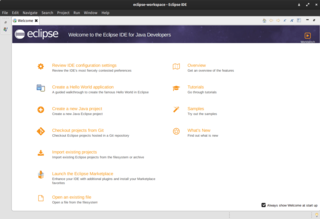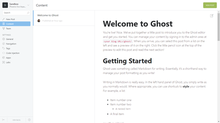
Eclipse is an integrated development environment (IDE) used in computer programming. It contains a base workspace and an extensible plug-in system for customizing the environment. It is the second-most-popular IDE for Java development, and, until 2016, was the most popular. Eclipse is written mostly in Java and its primary use is for developing Java applications, but it may also be used to develop applications in other programming languages via plug-ins, including Ada, ABAP, C, C++, C#, Clojure, COBOL, D, Erlang, Fortran, Groovy, Haskell, JavaScript, Julia, Lasso, Lua, NATURAL, Perl, PHP, Prolog, Python, R, Ruby, Rust, Scala, and Scheme. It can also be used to develop documents with LaTeX and packages for the software Mathematica. Development environments include the Eclipse Java development tools (JDT) for Java and Scala, Eclipse CDT for C/C++, and Eclipse PDT for PHP, among others.

Mozilla Thunderbird is free and open-source email client software which also functions as a full personal information manager with a calendar and contactbook, as well as an RSS feed reader, chat client (IRC/XMPP/Matrix), and news client. Available cross-platform, it is operated by the Mozilla Foundation's subsidiary MZLA Technologies Corporation. Thunderbird is an independent, community-driven project that is managed and overseen by the Thunderbird Council, which is elected by the Thunderbird Community. The project strategy was originally modeled after that of Mozilla's Firefox Web browser and is an interface built on top of that Web browser.

Movable Type is a weblog publishing system developed by the company Six Apart. It was publicly announced on September 3, 2001; version 1.0 was publicly released on October 8, 2001. The current version is 8.0.

WordPress is a web content management system. It was originally created as a tool to publish blogs but has evolved to support publishing other web content, including more traditional websites, mailing lists and Internet forum, media galleries, membership sites, learning management systems and online stores. Available as free and open-source software, WordPress is among the most popular content management systems – it was used by 43.1% of the top 10 million websites as of December 2023.

Gravatar is a service for providing globally unique avatars and was created by Tom Preston-Werner. Since 2007, it has been owned by Automattic, having integrated it into their WordPress.com blogging platform.

WordPress.com is a web building platform for self-publishing that is popular for blogging and other works. It is owned and operated by Automattic, Inc. It is run on a modified version of the WordPress software. This website provides free blog hosting for registered users and is financially supported via paid upgrades, "VIP" services and advertising.
Automattic Inc. is an American global distributed company which was founded in August 2005 and is most notable for WordPress.com, as well as its contributions to WordPress. The company's name is a play on founder Matt Mullenweg's first name and the word "automatic".

Pitivi is a free and open-source non-linear video editor for Linux, developed by various contributors from free software community and the GNOME project, with support also available from Collabora. Pitivi is designed to be the default video editing software for the GNOME desktop environment. It is licensed under the terms of the GNU Lesser General Public License.

Habari was a free and open source blog engine written in PHP and currently supports MySQL, SQLite and PostgreSQL for the database backend. It got its name from the Swahili greeting habari, which means "(what's the) news".

Etherpad is an open-source, web-based collaborative real-time editor, allowing authors to simultaneously edit a text document, and see all of the participants' edits in real-time, with the ability to display each author's text in their own color. There is also a chat box in the sidebar to allow meta communication.

Kickstarter, PBC is an American public benefit corporation based in Brooklyn, New York, that maintains a global crowdfunding platform focused on creativity. The company's stated mission is to "help bring creative projects to life". As of February 2023, Kickstarter has received US$7 billion in pledges from 21.7 million backers to fund 233,626 projects, such as films, music, stage shows, comics, journalism, video games, board games, technology, publishing, and food-related projects.

Diaspora is a nonprofit, user-owned, distributed social network. It consists of a group of independently owned nodes which interoperate to form the network. The social network is not owned by any one person or entity, keeping it from being subject to corporate take-overs or advertising. According to its developer, "our distributed design means no big corporation will ever control Diaspora."
Zero ASIC Corporation, formerly Adapteva, Inc., is a fabless semiconductor company focusing on low power many core microprocessor design. The company was the second company to announce a design with 1,000 specialized processing cores on a single integrated circuit.

The Ouya, stylized as OUYA, is an Android-based microconsole developed by Ouya Inc. Julie Uhrman founded the project in 2012, bringing in designer Yves Béhar to collaborate on its design and Muffi Ghadiali as VP of Product Management to put together the engineering team. Development was funded via Kickstarter, raising US$8.5 million, becoming one of the website's highest earning projects in its history.
Video game development has typically been funded by large publishing companies or are alternatively paid for mostly by the developers themselves as independent titles. Other funding may come from government incentives or from private funding.

Twister is a decentralized, experimental peer-to-peer microblogging program which uses end-to-end encryption to safeguard communications. Based on BitTorrent- and Bitcoin-like protocols, it has been likened to a distributed version of Twitter.

The fediverse is a collection of social networking services that can communicate with each other using a common protocol. Users of different websites can send and receive status updates, multimedia files and other data across the network. The term fediverse is a portmanteau of "federation" and "universe".
Micro.blog is a microblogging and social networking service created by Manton Reece. It is the first large multi-user social media service to support the Webmention and Micropub standards published by the World Wide Web Consortium, and is part of the Fediverse, supporting ActivityPub.

Flarum is Internet forum software written primarily in PHP, and a combination of JavaScript and TypeScript for its user interface. It was created as part of a merger of two existing forum software, FluxBB and esoTalk, and their two main developers, Franz Liedke and Toby Zerner.














